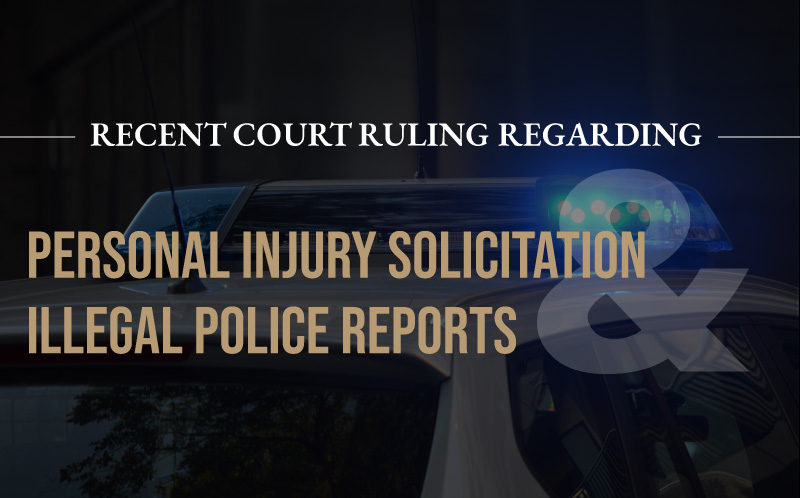Personal Injury Solicitation and Illegally Obtaining Police Reports

Federal prosecutors in Detroit recently announced guilty pleas and indictments of lawyers and others engaged in the alleged illegal solicitation of personal injury clients and selling of police reports. Grand Rapids personal injury lawyer, Tom Sinas, spoke with Fox 17 in a special two-part “Know the Law” series to discuss personal injury solicitation and the rules regarding obtaining police reports.
What is Attorney Solicitation?
First, one should understand the code of ethics, also called the Rules of Professional Conduct, which applies to all lawyers. Those Rules contain a prohibition against solicitation of any kind by any lawyer. Therefore, lawyers cannot actively solicit someone in hopes of that person hiring them for legal representation.
Furthermore, Michigan has enacted criminal statutes that deal specifically with personal injury solicitation. Michigan has a statute that makes it a crime, not just an ethical violation, for anyone to solicit a person for representation in a personal injury claim. Anyone who violates this statute or helps violate this statute can be found guilty of a misdemeanor, which can subject the violator with up to six months of imprisonment.
Illegal Healthcare Information Exchange for Purposes of Solicitation
In addition to this attorney solicitation law, Michigan law prohibits the illegal sharing or selling of patient information. Therefore, if anyone in a healthcare institution provides someone outside of the organization with private, confidential patient information without the patient’s consent for purposes of solicitation, then that person can be subject to criminal prosecution with possible jail time for up to six months.
Personal Injury Solicitation After a Car Accident
In addition to the two rules already mentioned, Michigan has another statute that deals with people involved in car accidents. That statute says “A person shall not intentionally contact any individual that the person knows has sustained a personal injury as a direct result of a motor vehicle accident, or an immediate family member of that individual, with a direct solicitation to provide a service until the expiration of 30 days after the date of that motor vehicle accident.” This does not apply if (1) the individual or his or her immediate family member has requested the contact from that person; or if (2) the person is an employee or agent of an insurance company and the person is contacting the individual or his or her family member on behalf of that insurance company to adjust a claim.
Basic Rules Regarding Generating and Preparing Police Reports
In addition to the rules already discussed, Michigan law also governs the generation of police reports regarding car accidents, as well as who can obtain those police reports and for what purposes. In Michigan, drivers must report any crash they are involved in resulting in any injuries, death, or apparent vehicle damage exceeding $1,000. Drivers in these situations must immediately report the collision to the nearest police station or police officer.
A police officer must then generate a police report of the crash. Once the report is generated by a local police department or county sheriff’s office, it is forwarded to the Michigan State Police. The Michigan State Police thus has access to all the police reports regarding Michigan car accidents in a central database.
Who Can Access Police Reports in Michigan?
Michigan has a statute regarding other people accessing police reports. Furthermore, anyone who accesses a police report within the 30-day time period following a car accident must sign a statement indicating that they understand they cannot use the report in a direct solicitation of an individual, vehicle owner, or property owner listed in the report. Furthermore, they must acknowledge that they will not disclose any information found in the report to any third-party. Anyone who violates this rule can be subject to criminal prosecution resulting in a misdemeanor charge, imprisonment for up to a year, and a fine up to as much as $60,000.
These recent legal developments demonstrate the seriousness of personal injury solicitation and illegally obtaining police reports in Michigan. When considering a lawyer to represent you, it is important to first understand the rules of conduct attorneys must follow in Michigan. Secondly, any attorney you interview or speak with should be dedicated to abiding by the Rules of Professional Conduct, as well as the many various statutes set in place under Michigan law to protect people from these types of illegal solicitations.
Tom Sinas explains the seriousness of personal injury solicitation in Part 1 of this “Know the Law” series.
Tom Sinas discusses how police reports are generated and who has access to them, as well as illegally obtaining a police report.

